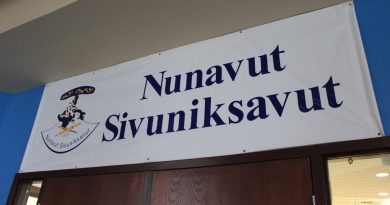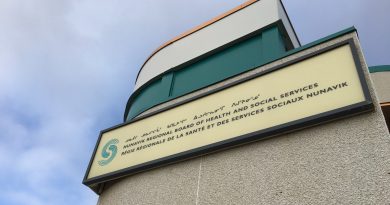‘They’re reaching for this’: Alaska students compete in Yup’ik and Iñupiaq spelling bees
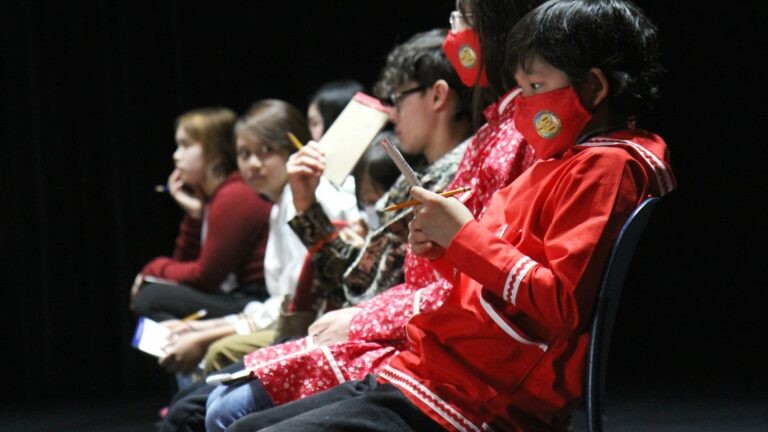
By Katie Anastas, Alaska Public Media
Alayna Canoe, a seventh grader from Nunam Iqua, stood on stage Saturday in a red and white floral kuspuk and accepted her first place award in the Yup’ik spelling bee.
“I’m a bit shocked,” she said after the award ceremony at Alaska Pacific University in Anchorage. “I was a little bit scared, but mostly confident.”
There was one word she found really difficult to spell: cuukiiq. It means sock.
“I just forgot one u,” she said.
Canoe was one of 13 students, in third through eighth grade, who competed in this weekend’s 10th annual Yup’ik spelling bee. They came from all over Alaska: Akiachak, Akiak, Anchorage, Brevig Mission, Dillingham, Golovin, Nunam Iqua and Stebbins.
Freda Dan, organizer of the Yup’ik contest, was one of the judges. She said the spelling bee gives students the opportunity to practice reading and writing a language they might only speak or hear. Canoe, for example, doesn’t speak Yup’ik but hears it spoken by elders.
“This might be the only time they learn how to spell,” Dan said. “Maybe it never happens again. So this is a really big opportunity.”
Drive to learn “inspiring”
This weekend’s event also included the second annual Iñupiaq spelling bee with three competitors.
Among the challenges of the day: capitalization. Both the Yup’ik and Iñupiaq competitors struggled with the word for the Yukon River, for instance. In Iñupiaq, the word is Kuuvak. When not capitalized, kuuvak means big river. The judges were asking for the capitalized version, but students didn’t know unless they asked for the definition.
Kuuvak was the word that brought the Iñupiaq competition to a close. Fifth grader Kopeck Kaitlyn Alston from Brevig Mission placed first.
Dan said the competitors’ drive to learn was inspiring.
“It feels like they’re reaching for this — they’re reaching to have this,” she said. “They take it upon themselves to do this. That’s what keeps me going year after year, feeling the enthusiasm of the spellers.”
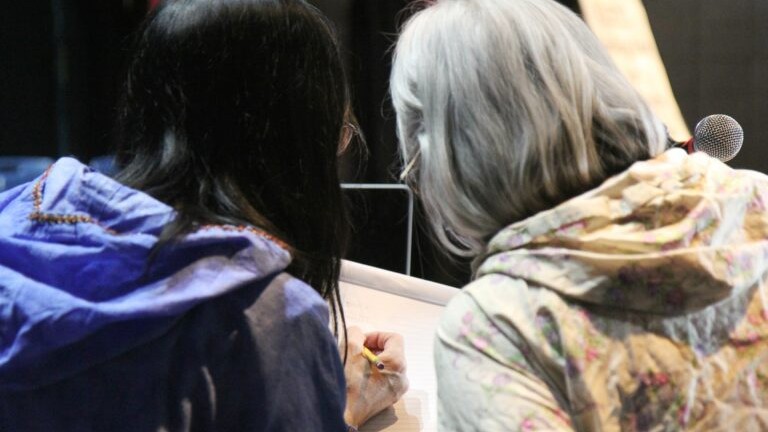
Dan set up the first Yup’ik spelling bee 10 years ago. She said she came up with a list of words and created study guides for coaches around the state. Many of the words are frequently used in day-to-day conversations, she said. She also chose a few more obscure words to help kids build their vocabularies.
Dan is also part Iñupiaq, and in recent years, she worked with volunteers to set up the Iñupiaq spelling bee.
Spectators weren’t allowed at last year’s competition because of COVID-19, and only one school signed up to participate in that year’s Iñupiaq bee. This year, two schools made it to the Iñupiaq competition and five made it to the Yup’ik one.
For Dan, the spelling bee is worth it even if the number of competitors isn’t huge.
“It’s never going to have that [many] spellers per language, and it was sad to realize that it was not going to grow beyond a certain level,” she said. “The pandemic made me realize that it was really OK to just have one school in, because their effort was so inspiring, and they were so brave. I have to realize that, whatever I get, it’s worth it for that child.”
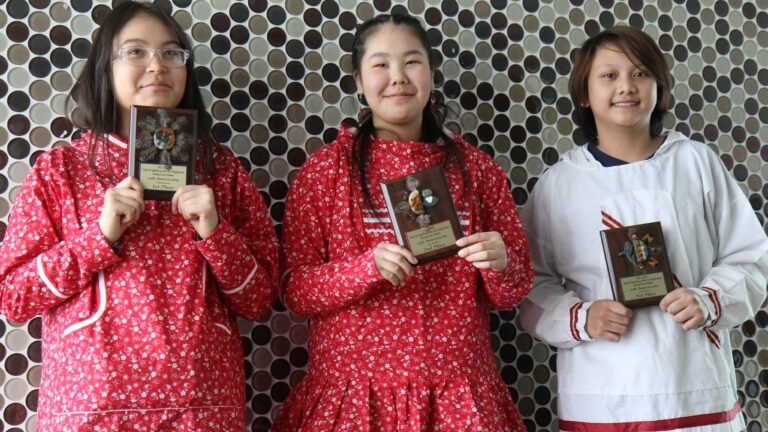
Suzzuk Mary Huntington is the coordinator of the Iñupiaq spelling bee. As the cultural programs coordinator for the Bering Strait School District, she works with students from several different villages who speak several different dialects.
She said determining the “correct” spelling of a word can be a difficult process that’s loaded with meaning. An elder might spell a word differently than she usually does. Or, there might be an Anglicized pronunciation that could confuse a student learning how to spell.
Despite the challenges, Suzzuk said, promoting literacy in Native languages through the spelling bee is vital.
“Almost any place in our language learning journey has so many structures built in that shut us down and make us feel inferior and incapable,” she said. “Any opportunity to eliminate the judgment and the inadequacy factors, they’re not just helpful, they’re 100% needed.”
In the auditorium this weekend, 16 students took that opportunity to make sure Yup’ik and Iñupiaq don’t fade away.
Related stories from around the North:
Canada: Mark Indigenous languages decade by making Inuktitut official in Canada: Inuit UN rep, The Canadian Press
Finland: Everyone encouraged to boost Sami language visibility in Finland, Norway and Sweden this week, Eye on the Arctic
Norway: Indigenous and minority language names for Norway now have official status, The Independent Barents Observer
Russia: German project to house everything published in Siberian and Arctic languages to seek new funding, Eye on the Arctic
United States: Inuit leaders applaud UN move to designate International Decade of Indigenous Languages, Eye on the Arctic


